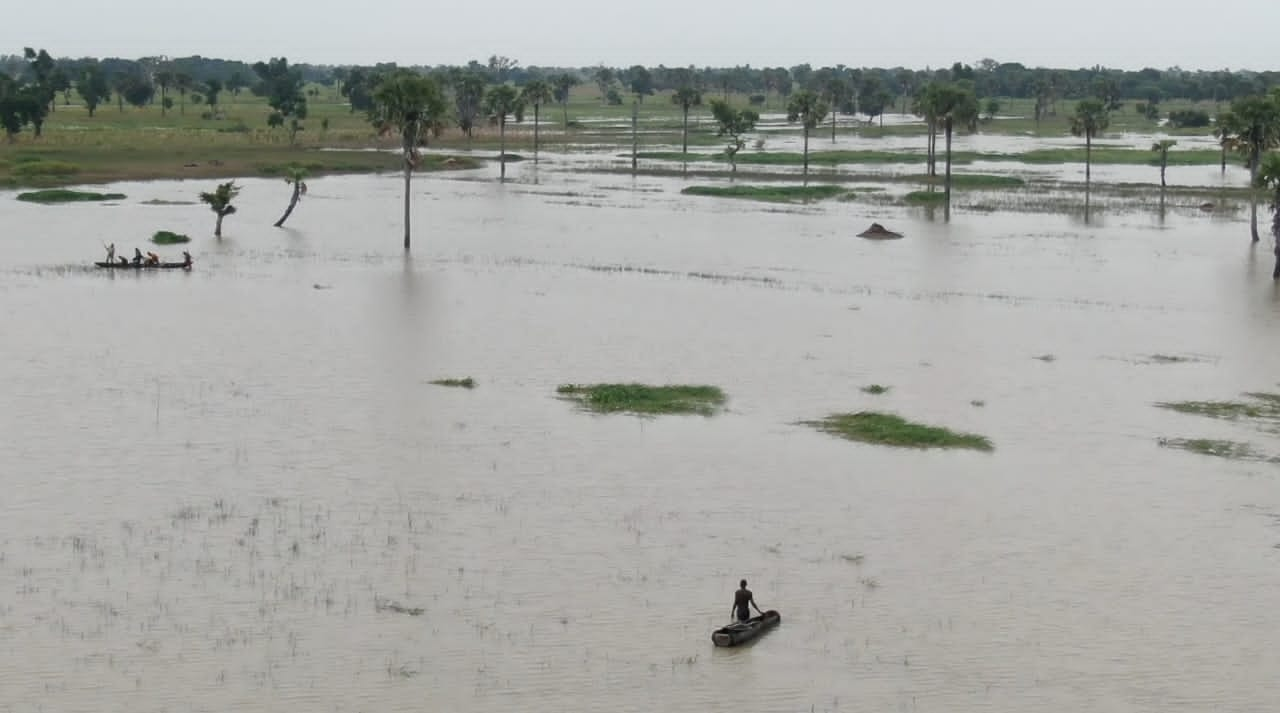In spite of the alarm that frontline states along the River Benue will soon be invaded by massive floods, evacuation of residents of vulnerable communities has not started, checks by Daily Trust have revealed.
The Minister of Humanitarian Affairs and Poverty Alleviation, Betta Edu, had, at a press conference in Abuja on Monday, asked state governors to immediately evacuate citizens from flood-prone communities to safer places in order to avoid loss of lives and property.
The minister had warned that the opening of the Lagdo Dam in Cameroon would lead to floods in all the states on the path of the River Benue within seven days.
Before she spoke, the National Emergency Management Agency had, on Sunday, said Benue, Kogi, Nasarawa, Taraba and Adamawa states would be directly affected, and that the impact would also be felt in Plateau, Delta, Gombe, Bauchi and Cross River states.
- APGA, APC trade blame over non-conduct of LG elections in Anambra
- 15bn Yuan currency swap deal with China still on course, CBN Replies Falana
NEMA recalled that it had, even before the Lagdo Dam was opened, asked the states to evacuate people from vulnerable communities.
Experts say Nigeria had not learnt any lesson despite experiencing flooding for many years with attendant loss of lives and property.
There was no noticeable permanent solution against flood in any of the frontline states, as people living around river banks only vacate such places when it is evident they would be consumed; only to return to such dangerous places once the waters receded.
Taraba
Our correspondent learnt that some rice farms were already flooded owing to the release of water from the Lagdo Dam. A resident of Sheka in Gassol Local Government Area, Dauda Lawal, said residents, who are mainly fishermen and farmers, said communities in Sheka and other villages usually relocate to Mutumbiyu, Tutare, Taka Wurkum between August and September.
This is even as communities in Zip, Kwatan Nanido, Amar, Dampar and Kwatanta Taru in Gassol, Ibbi and Lau LGAs of the state have started relocating with their families to areas far away from the river.
This followed a radio announcement by the state government warning communities in six local government areas located by the River Benue of an impending flood as a result of the opening of the Lagdo Dam.
Benue govt yet to provide evacuation space
In Benue State, evacuation has not started though the State Emergency Management Agency said it had disseminated information warning the residents at risk to move to higher grounds. SEMA’s Information Officer, Charity Agber, told our correspondent that the state government had not yet provided a space for flood vulnerable residents.
She, however, noted that the agency had stepped up sensitisation and awareness to ensure people were not caught unawares.
The spokesperson for the state’s Ministry of Environment and Water Resources, Kelas Onum, said what needed to be done had been put in place, adding that people were expected to evacuate themselves from their homes. Residents of high-risk communities like Gyado Villa, Kutcha-Utebe and Wurukum in Benue State were said to have moved out of their homes.
A resident of Gyado Villa, Pyhlis Agber, said: “It happened to me last year and my entire household items were lost to the flood. I don’t want a repeat of that experience because we (residents) have seen the River Benue rising and the water already coming close,” Agber said.
Residents of Angwa-Wurukum, Wadata and several others prone to flooding said they were still waiting for the state government to provide them a place to relocate to.
Adamawa
Communities along River Benue have not yet started relocating to higher grounds.
Residents along the banks of River Benue said they were still monitoring the situation as the water level was tolerable with farming activities taking place.
A resident of Girei, Joe Nathan said he would evacuate when the flood began to pose actual threats to the community, saying he could not rush to abandon his means of livelihood.
Executive Secretary, Adamawa SEMA, Muhammad Amin Sulaiman said the state had put all its relevant agencies and partners on alert for possible evacuation.
He said people had been advised to leave flood-prone areas even as the agency prepared for contingencies.
Kogi to convene meeting on evacuation process
Residents at the flood-prone zone in Lokoja have started relocating to safer areas in the city. Our correspondent learnt that several residents of Adankolo yesterday evacuated their belongings.
“I have reached out to my uncle at the Lokogoma phase 11 area in Lokoja to allow us to pack our belongings to one of his vacant rooms. I don’t want to wait for the government or any other organisation to tell me before I pack out. I know what I suffered in last year’s flooding, said Hajia Jemila Adamu, a resident.
President, Ibaji Progressive Youths Association, Kevin Apeh, said nothing was on the ground to enhance relocation of the inhabitants of the community.
“The water collected from torrential rainfall has already taken over Ibaji land, and the council has been cut off from the Idah axis, the only possible road to the Ibaji communities. The state Commissioner for Environment, Victor Omofaye, said a meeting to fine-tune the evacuation process would be held in Lokoja today.
“Critical stakeholders are meeting on Wednesday to finalise all issues concerning the evacuation and relocation of those residents living at the flood prone areas in the state.
“In our proactive move, landscaping in several street roads and clearing of drainages to allow free flow of water have been carried out.
“Refugee camps across the state, including flood estates in Lokoja, were being put in proper shape for the expected flood victims to start moving in. Hopefully, after Wednesday’s stakeholders meeting, relocation of people will commence,” he said.
He said the government was striving to convince those people laying claim to their ancestral lands to see reasons to relocate to a safer place to avoid unnecessary hardships during flooding.
“The government is telling them that the vagaries of nature know no ancestral land. We’re saying we value their lives, impressing them that securing their lives first is more important than holding on to ancestral land and dying from the range of flooding”, he said.
We’re on top of the situation- NIWA
The National Inland Waterways Authority (NIWA) said it had put many things in place, both human and material resources to assist the evacuation and relocation of people at the coastal zone.
“We have taken proactive measures, by restructuring all our regional offices; equipping them with the necessary personnel and materials.
“Materials like Life jackets and its likes have been provided in many of these our rehabilitated offices across the state, boats and ferries have been put in shape and stationed in some of our regional offices,” he said.
He added that the agency was set to carry people (refugees) free-of-charge to their various destinations in the event of flooding.
Bauchi
The Bauchi State government yesterday said it was planning relocation of flood-prone communities.
Director-General, Bauchi State Environmental and Sanitation Agency, Ibrahim Kabir, told our correspondent that evacuation would be done via pairing method and division of waterways in the affected communities.
“The pairing method is where communities in safer areas will be hosting the flood-prone communities because we don’t want to create IDPs camps to avoid social issues and other challenges as a way to mitigate the trauma. We want to integrate the vulnerable communities into the immediate community. We’re working with households that are willing to host the vulnerable ones.
“An example is the Dindima community that may likely encounter flooding and we’re planning to relocate them to the safer area, but if the entire town is affected, we’ll evacuate the people to the immediate town that is far away from the river.
“Tomorrow (Wednesday), we’re going to start the division of waterways at Cheledi town in Kirfi LGA.”
Cross River
The Cross River State government has not yet evacuated its residents from the communities identified to be flood prone, according to the Director-General of the State Emergency Management Agency, Angela Ogeyi Odey.
She, however, said the state was well prepared for the impending flood. She said 11 local government areas in the riverine areas of the state are vulnerable, including Calabar Municipality, Ikom, Ogoja, Yakurr, Yala, Bakassi, Akpabuyo, Etung, Odukpani, Obubra and Biase LGAs.
“For flood, we’re fully prepared in Cross River State. We’re preparing our manpower, training our men on how to evacuate people.
She said: “We’re getting the relief materials ready, flying boats to evacuate people. We’ve been talking to town criers to spread the news. After evacuation, we’re making plans to keep them. We have hostels, schools and other places to keep them till October.”
Plateau
In Plateau State, about four local government areas including Jos North, Shendam, Langtang North and Langtang South are flood-prone areas and every year, communities there are affected.
Residents of Tudun Osi of Jos North LGA said they were not told about this year’s flood.
Babangida Abunusaiba, a resident of the community, said, “At the moment, we have not seen anyone coming to either relocate or evacuate residents of the community.”
Umar Ashiru, another resident, said “We haven’t seen anything for now but we don’t know if the SEMA would come at a later time.”
But the secretary of SEMA, Sunday Audu, said: “We’ve already told people about it. Although Plateau is not among the states, all flood-prone areas are aware and everybody should take measures.”
Delta
Residents of communities vulnerable to flood in Delta State have cried out to the state government begging for evacuation.
SEMA officials in the state could not be reached as phone calls to them were not answered.
Build new locations for evacuation, don’t use schools–ActionAid
Country Director, ActionAid Nigeria (AAN), Andrew Mamedu, urged state governments to build new locations that would serve as higher grounds for evacuation of residents from flood-prone areas rather than use schools.
He spoke in Abuja during his unveiling as the 7th head of the organisation by the AAN Nigeria Board’s chairman, Jummai Umar-Ajijola.
“What we’re meeting with the government is on the issue of asking people to go to higher grounds, and our question is where is the higher ground? Not places like schools that would keep our children out of school. NYSC camps could be used as higher grounds if they’re available or we build new locations.
“Those are the things, long term and sustainable things we’re looking at when we are dealing with floods.”
From Hope A. Emmanuel (Makurdi), Eyo Charles (Calabar), Ado A. Musa (Jos), Kabiru R. Anwar (Yola), Tijani Labaran (Lokoja), Hassan Ibrahim (Bauchi) Magaji I. Hunkuyi (Jalingo) Meluwa Kelvin (Asaba) & Abbas Jimoh (Abuja)

 Join Daily Trust WhatsApp Community For Quick Access To News and Happenings Around You.
Join Daily Trust WhatsApp Community For Quick Access To News and Happenings Around You.


